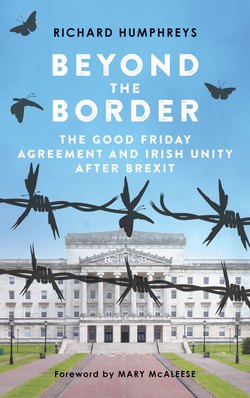Читать книгу Beyond the Border - Richard Humphreys - Страница 10
На сайте Литреса книга снята с продажи.
ОглавлениеPreface
This book seeks to discuss and explain the implications of the Good Friday Agreement in relation to any possible future change to the constitutional status of Northern Ireland. It is clear that there remains misunderstanding on many sides as to what the Agreement means. This book is an endeavour to explain the Agreement and its implications. It is not meant to be a political work in any sense. It is written in a personal and academic capacity. It does not argue for or indeed against Irish unity; obviously there are many weighty arguments on both sides which must be left to political debate. Nor does it even seek to encourage debate about a change in the constitutional status of Northern Ireland. The empirical fact is, however, that unity is currently being discussed, and that discussion is hampered by a certain amount of misconception about what the Agreement involves. This book, therefore, is an attempt to explain the Agreement and its implications, and to set out the legal and constitutional parameters. There is, of course, scope for political judgement within those parameters, as long as the constraints of the Agreement itself are acknowledged. Within those constraints, my intention is to leave any judgements on political issues to the political realm.
This book grew out of my 2009 book, Countdown to Unity, which, in turn, developed out of research I began in 2003 for my Ph.D. thesis. My interest in the area was stimulated by having had the privilege of attending, at the outer edge of the Irish delegation, the opening and early sessions of the phase of multi-party talks that began in Stormont in 1996. Those talks ultimately evolved into the process that delivered the Good Friday Agreement two years later.
Since the previous book was published by Irish Academic Press in 2009, there have been significant changes in the constitutional situation. The June 2016 decision by the people of the UK to withdraw from the European Union has created a new context for discussion of the implications of the Good Friday Agreement for possible constitutional outcomes. In addition, the collapse of the Northern Ireland Executive in January 2017 marked a step back for the implementation of the Agreement.
The previous book provided some stimulation for the August 2017 Report of the Oireachtas Joint Committee on the Implementation of the Good Friday Agreement. That report, prepared with the assistance of rapporteur Senator Mark Daly, was a development which made a renewed look at the implications of the Agreement more timely. The 2017 report seems to have taken up where the 2009 book left off; but a lot has changed in the meantime, particularly in terms of difficulties with implementing devolution. That situation changes the context and the emphasis.
Overall, I have attempted to outline the implications of the Agreement and identify principles from it which are offered in the hope of contributing to a shared understanding of the constitutional space within which a debate about alternative futures can be pursued in as accommodating a manner as possible. Finally I should note that any views expressed do not reflect on any actual or potential litigation and are, in the forensic context, ‘subject to hearing argument’.
Richard Humphreys
April 2018
